No products in the cart.
Sale
Setmelanotide TFA | Selective MC4R Agonist for Research
Original price was: $28.00.$22.00Current price is: $22.00.
Setmelanotide TFA (RM-493 TFA) is a selective MC4R agonist that demonstrates high potency in both human and rat receptor assays. It is a valuable research tool for investigating metabolic regulation, obesity pathways, and energy homeostasis.
Description
Product Description
Setmelanotide TFA, also known as RM-493 TFA, is a highly selective and potent melanocortin 4 receptor (MC4R) agonist. MC4R is a G-protein-coupled receptor that plays a crucial role in regulating energy balance, appetite control, and metabolic homeostasis. Mutations or dysregulation of the MC4R pathway are strongly associated with severe obesity, making it one of the most important molecular targets for studying weight regulation and related metabolic disorders.
Setmelanotide TFA has been engineered to specifically activate MC4R with remarkable potency, with EC50 values of 0.27 nM in human models and 0.28 nM in rat models. Such strong receptor activity highlights its importance as a pharmacological tool for exploring receptor-ligand interactions, G-protein signaling cascades, and downstream metabolic effects. In preclinical research, this compound has been widely applied to study mechanisms of appetite suppression, fat metabolism, glucose regulation, and neuroendocrine signaling.
The role of the melanocortin system in human physiology is extensive. MC4R is expressed in the hypothalamus and other central nervous system regions, where it integrates signals from leptin, insulin, and other hormones involved in energy homeostasis. By selectively binding to and activating MC4R, Setmelanotide TFA mimics endogenous melanocortin peptides such as α-MSH, leading to reduced food intake and increased energy expenditure. Unlike non-selective agonists that target multiple melanocortin receptors, Setmelanotide TFA demonstrates high specificity for MC4R, minimizing off-target effects and allowing precise mechanistic studies.
For metabolic research, Setmelanotide TFA provides a valuable platform to study genetic forms of obesity caused by MC4R pathway mutations. In preclinical models, administration of this agonist has been shown to restore signaling through impaired pathways, demonstrating its potential utility as a model drug candidate. Researchers can also use it to investigate neuronal circuits regulating feeding behavior, hormone signaling crosstalk, and adaptive mechanisms of energy utilization.
Furthermore, Setmelanotide TFA is relevant in the context of pharmacological research on rare inherited obesity syndromes, such as POMC deficiency, LEPR deficiency, and MC4R deficiency. In these conditions, the melanocortin pathway fails to properly regulate appetite, leading to early-onset severe obesity. By restoring downstream MC4R activity, this agonist provides a unique approach to evaluating therapeutic interventions.
The trifluoroacetate (TFA) salt form ensures stability, solubility, and extended shelf life of the peptide agonist. Lyophilized powder supplied in TFA salt form is compatible with both aqueous and organic solvents, allowing for flexibility in laboratory use. Researchers benefit from the reproducibility and quality of GMP-standard peptide synthesis, which guarantees consistent results in both in vitro and in vivo models.
Overall, Setmelanotide TFA is not only a powerful pharmacological tool for probing MC4R function but also a versatile reagent for obesity, metabolism, and endocrinology research. Its strong selectivity and reproducibility allow mechanistic insights into the melanocortin system, providing researchers with opportunities to explore novel therapeutic strategies targeting energy regulation and metabolic disorders.
Product Specifications
| Parameter | Details |
|---|---|
| Product Name | Setmelanotide TFA |
| Synonyms | RM-493 TFA, MC4R agonist |
| CAS Number | Not assigned |
| Molecular Formula | C___H___N___O___ (exact upon request) |
| Molecular Weight | Available upon request |
| Purity | ≥95% (HPLC) |
| Appearance | White to off-white lyophilized powder |
| Formulation | Trifluoroacetate (TFA) salt |
| Solubility | Soluble in DMSO, PBS, and water |
| Storage Conditions | Store at -20°C, avoid freeze-thaw cycles |
| Stability | Stable for ≥24 months (lyophilized), 1–2 weeks in solution at 4°C |
| Biological Activity | Potent and selective agonist of melanocortin 4 receptor (MC4R) |
| EC50 Values | Human MC4R: 0.27 nM; Rat MC4R: 0.28 nM |
| Applications | Metabolic disease research, obesity pathway studies, energy homeostasis, neuroendocrine signaling |
| Safety | For laboratory research use only, not for human or veterinary use |
The detailed product specifications ensure reproducibility and reliability in research applications. Its high purity ensures that observed biological effects can be attributed to MC4R-specific activity rather than impurities. The TFA salt form offers enhanced solubility and handling characteristics, which are advantageous for biochemical assays, receptor-binding studies, and in vivo administration.
Mechanism of Action & Research Applications
Setmelanotide TFA functions as a highly potent and selective MC4R agonist, making it a cornerstone in metabolic research.
Mechanism of Action
Receptor Binding: Setmelanotide binds with high affinity to MC4R in the hypothalamus.
Signal Transduction: Upon activation, MC4R stimulates adenylate cyclase, increasing cAMP levels and initiating downstream signaling cascades.
Appetite Regulation: By mimicking endogenous melanocortin activity, Setmelanotide suppresses appetite and promotes satiety.
Energy Expenditure: Activation of MC4R increases thermogenesis and basal metabolic rate.
Glucose Regulation: Studies suggest improved insulin sensitivity and glucose handling.
Research Applications
Obesity Research: Investigate mechanisms underlying rare inherited obesity syndromes and general metabolic dysregulation.
Endocrine Studies: Assess cross-talk between melanocortin signaling and hormonal regulators such as leptin and insulin.
Neurobiology of Appetite: Map neuronal circuits and neurotransmitter systems influenced by MC4R activation.
Pharmacological Development: Explore dosing strategies, receptor selectivity, and formulation stability for translational research.
Comparative Studies: Compare efficacy across different species to understand evolutionary aspects of energy regulation.
Combination Therapies: Study synergistic effects with other metabolic modulators such as GLP-1 receptor agonists.
Setmelanotide TFA allows researchers to probe deeply into the intersection of neuroendocrinology and metabolism, making it an invaluable tool for studying appetite regulation, energy expenditure, and therapeutic strategies for obesity.
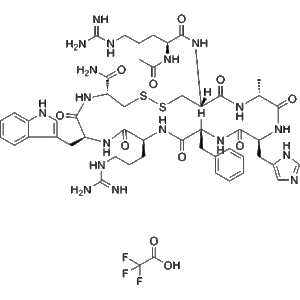
Side Effects (For Reference in Research Models)
In preclinical models, administration of Setmelanotide TFA has been associated with the following observations:
CNS-Mediated Effects: Some subjects display changes in activity patterns, reduced feeding, and altered behavior due to hypothalamic signaling.
Cardiovascular Changes: Potential modulation of heart rate and blood pressure due to central melanocortin activity.
Metabolic Adjustments: Rapid weight loss and metabolic changes may require careful monitoring in animal models.
Injection Site Reactions: Local irritation or inflammation can occur depending on formulation and route of administration.
Hyperpigmentation: Because melanocortins also influence pigmentation pathways, skin darkening effects have been noted in some experimental contexts.
Experimental Considerations
Proper dosing is critical to balance receptor activation and minimize off-target consequences.
Longitudinal monitoring of metabolic and endocrine biomarkers is recommended.
Combination with other pharmacological tools requires careful evaluation to avoid confounding effects.
All use should be strictly confined to controlled laboratory environments.
Disclaimer
For laboratory research use only. Not for human or veterinary use.
Keywords
Setmelanotide TFA, RM-493 TFA, MC4R agonist, melanocortin 4 receptor peptide, appetite regulation peptide, obesity research compound, metabolic research peptide, selective receptor agonist
Additional information
| Weight | 0.8 kg |
|---|---|
| Dimensions | 56 × 23 × 56 cm |
What is Setmelanotide TFA?
A potent and selective agonist of the melanocortin 4 receptor (MC4R).
What are its EC50 values?
0.27 nM for human MC4R and 0.28 nM for rat MC4R.
What research areas is it used in?
Obesity research, appetite regulation, metabolic disease studies, and neuroendocrine research.
What is the advantage of the TFA form?
Enhanced solubility, stability, and ease of handling in research assays.
How should it be stored?
Store lyophilized powder at -20°C; avoid repeated freeze-thaw cycles.
Is it suitable for in vivo research?
Yes, when handled under proper laboratory protocols.
Does it affect pigmentation?
Potential hyperpigmentation effects may be observed in preclinical studies.
Is it GMP-grade?
Available in high-purity research-grade format; GMP-compliant synthesis available upon request.
Can it be combined with other therapies?
Yes, often studied alongside other metabolic modulators, though monitoring is required.
Is it approved for clinical use?
No, it is provided strictly for laboratory research use only.

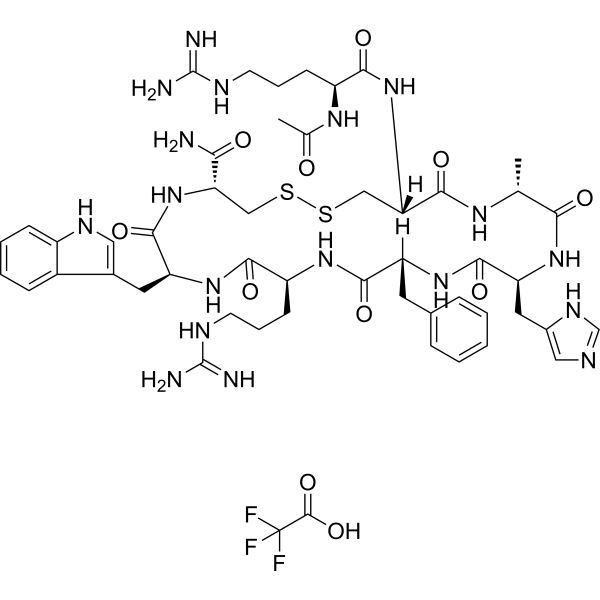

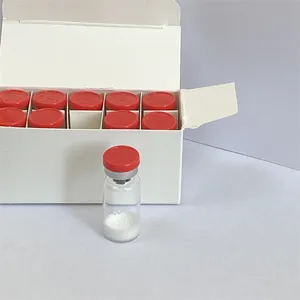



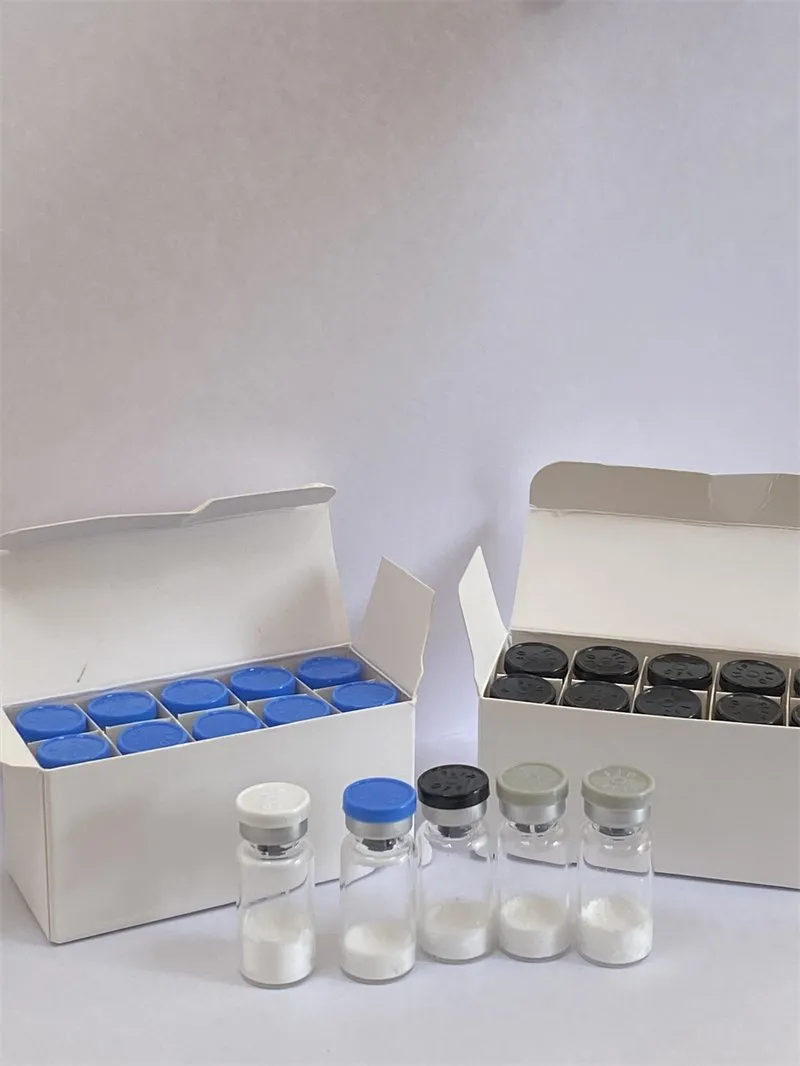

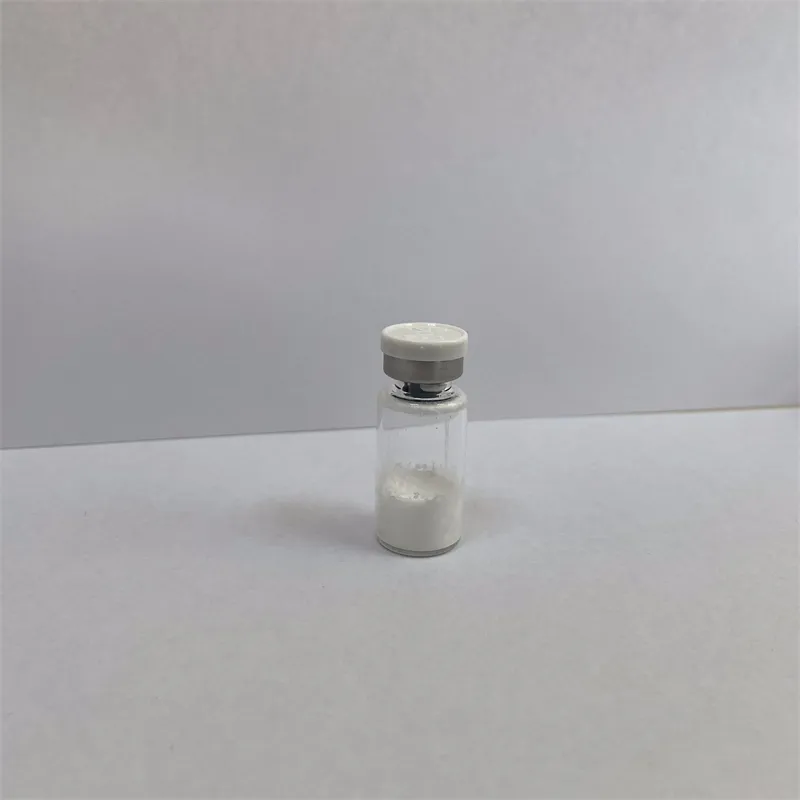





Reviews
There are no reviews yet.